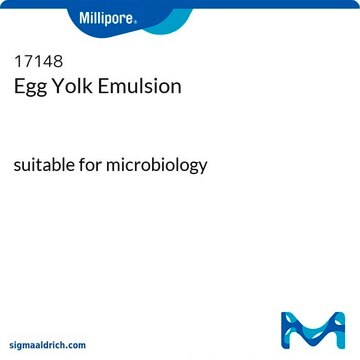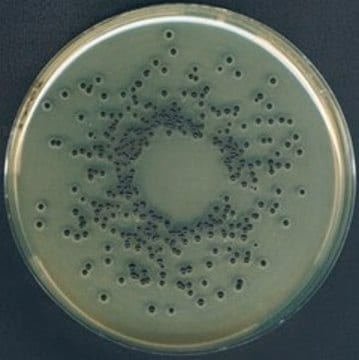12282
Hoyle′s tellurite agar, base
NutriSelect® Plus, suitable for microbiology
Synonym(s):
Hoyle′s Medium, Base
Sign Into View Organizational & Contract Pricing
All Photos(1)
About This Item
UNSPSC Code:
41171606
NACRES:
NA.85
Recommended Products
sterility
non-sterile
Quality Level
form
powder
composition
agar, 15.0 g/L
beef extract, 10.0 g/L
peptic digest of animal tissue, 10.0 g/L
sodium chloride, 5.0 g/L
manufacturer/tradename
NutriSelect® Plus
final pH
7.8±0.2 (25 °C)
application(s)
clinical testing
food and beverages
microbiology
suitability
Corynebacterium spp.
Application
Hoyle Medium Base is a highly selective medium used for the isolation and differentiation of Corynebacterium diphtheriae types.
Preparation Note
Suspend 40 grams in 915 ml distilled water. Heat to boiling to dissolve the medium completely. Sterilize by autoclaving at 15 lbs pressure (121°C) for 15 minutes. Cool to 55°C and aseptically add 50 ml of laked blood and 35 ml of 1.0% Potassium Tellurite Solution. (Cat. No. 17774) Mix well and pour into sterile Petri plates.
Footnote
We offer two media types: the superior granulated GranuCult® and the cost-efficient powdered NutriSelect® culture media, depending on your needs.
The designations basic, plus, or prime are added to indicate the quality control level, from basic quality control to standard QC plus to prime for full regulatory compliance.
The designations basic, plus, or prime are added to indicate the quality control level, from basic quality control to standard QC plus to prime for full regulatory compliance.
Legal Information
GRANUCULT is a registered trademark of Merck KGaA, Darmstadt, Germany
NutriSelect is a registered trademark of Merck KGaA, Darmstadt, Germany
Storage Class Code
11 - Combustible Solids
WGK
WGK 3
Flash Point(F)
Not applicable
Flash Point(C)
Not applicable
Choose from one of the most recent versions:
Already Own This Product?
Find documentation for the products that you have recently purchased in the Document Library.
Dmitry V Chistyakov et al.
Cells, 8(12) (2019-12-07)
A phenomenon of endotoxin tolerance where prior exposure of cells to minute amounts of lipopolysaccharide (LPS) causes them to become refractory to a subsequent high-amount endotoxin challenge is well described for innate immune cells such as monocytes/macrophages, but it is
Our team of scientists has experience in all areas of research including Life Science, Material Science, Chemical Synthesis, Chromatography, Analytical and many others.
Contact Technical Service







